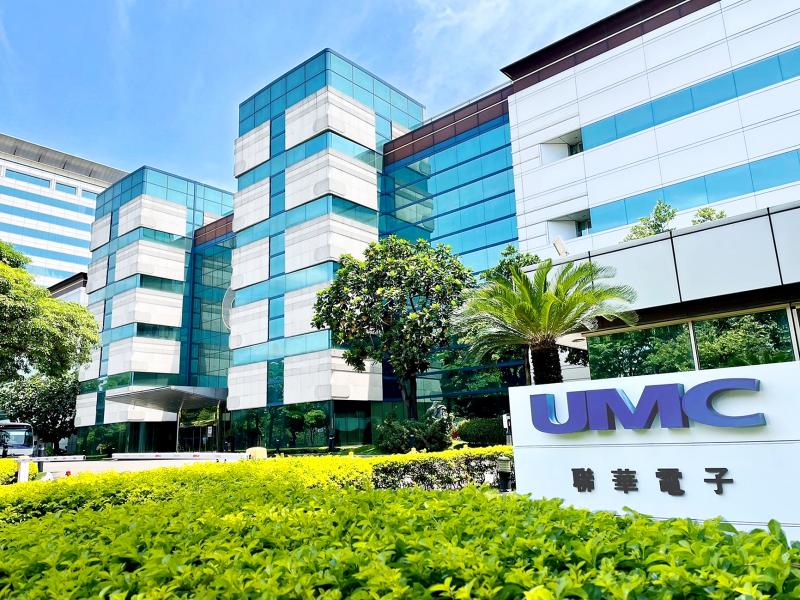Taiwan Semiconductor Manufacturing Co (TSMC, 台積電) and the nation’s major electronics makers yesterday increased their workplace anti-COVID-19 measures to the highest level as local infections spread to Hsinchu City.
TSMC, the world’s largest contract chipmaker, is headquartered at the Hsinchu Science Park (新竹科學園區).
The chipmaker said that its workforce has begun operating in separated teams to minimize the risk of COVID-19 infection.

Photo: Grace Hung, Taipei Times
Except for special cases, all non-essential vendors are to be restricted from entering its facilities, TSMC said in a statement.
Employees and long-term vendors must avoid moving from region to region within Taiwan, it added.
The chipmaker said that it has prohibited employees from holding face-to-face meetings, suspended domestic and overseas business travel, and canceled cross-site shuttle buses.
Shuttle buses are to operate according to the planned separation of work areas and movement flow, it said.
The prevention measures were last implemented when the nation entered a level 3 COVID-19 alert in May last year.
United Microelectronics Co (UMC, 聯電), the nation’s second-largest contract chipmaker, yesterday began similar COVID-19 prevention measures, with employees divided into two work groups and required to work in different zones, UMC spokesman Liu Chi-tung (劉啟東) said.
UMC has not activated a remote work policy yet, he said, but no visitors are allowed on the site.
Headquartered in Taoyuan, Quanta Computer Inc (廣達電腦), the world’s largest laptop maker, has increased its vigilance after the city became the epicenter of the latest outbreak of domestic infections in Taiwan.
Quanta yesterday said that it has raised workplace measures to their highest level.
“Food courts in the factories have been shut down. Employees are encouraged to order food via food delivery apps instead,” a company spokesperson said.
“Employees are required to eat lunch at their cubicles, as all public areas are closed,” the spokesperson added.
At Quanta, employees have already been working flexible hours for a while to avoid infection.
With the heightening of virus prevention measures, workers must avoid gatherings and remain in their designated work group and area, the spokesperson said, adding that meetings are to be conducted via videoconferencing.
Quanta’s move came after laptop contract maker Compal Electronics Inc (仁寶電腦) was forced to suspend factory operations in Taoyuan’s Pingjhen District (平鎮) for one week after an employee tested positive for COVID-19 yesterday.
The 1,800 employees underwent rapid COVID-19 tests over the weekend after the company discovered positive cases among its workforce. Those workers must undergo polymerase chain reaction tests on Wednesday.
Wistron Corp (緯創) and Inventec Corp (英業達) have also launched similar COVID-19 prevention measures, and their Lunar New Year parties have been canceled, the companies said.

Nvidia Corp’s demand for advanced packaging from Taiwan Semiconductor Manufacturing Co (TSMC, 台積電) remains strong though the kind of technology it needs is changing, Nvidia CEO Jensen Huang (黃仁勳) said yesterday, after he was asked whether the company was cutting orders. Nvidia’s most advanced artificial intelligence (AI) chip, Blackwell, consists of multiple chips glued together using a complex chip-on-wafer-on-substrate (CoWoS) advanced packaging technology offered by TSMC, Nvidia’s main contract chipmaker. “As we move into Blackwell, we will use largely CoWoS-L. Of course, we’re still manufacturing Hopper, and Hopper will use CowoS-S. We will also transition the CoWoS-S capacity to CoWos-L,” Huang said

Nvidia Corp CEO Jensen Huang (黃仁勳) is expected to miss the inauguration of US president-elect Donald Trump on Monday, bucking a trend among high-profile US technology leaders. Huang is visiting East Asia this week, as he typically does around the time of the Lunar New Year, a person familiar with the situation said. He has never previously attended a US presidential inauguration, said the person, who asked not to be identified, because the plans have not been announced. That makes Nvidia an exception among the most valuable technology companies, most of which are sending cofounders or CEOs to the event. That includes

INDUSTRY LEADER: TSMC aims to continue outperforming the industry’s growth and makes 2025 another strong growth year, chairman and CEO C.C. Wei says Taiwan Semiconductor Manufacturing Co (TSMC, 台積電), a major chip supplier to Nvidia Corp and Apple Inc, yesterday said it aims to grow revenue by about 25 percent this year, driven by robust demand for artificial intelligence (AI) chips. That means TSMC would continue to outpace the foundry industry’s 10 percent annual growth this year based on the chipmaker’s estimate. The chipmaker expects revenue from AI-related chips to double this year, extending a three-fold increase last year. The growth would quicken over the next five years at a compound annual growth rate of 45 percent, fueled by strong demand for the high-performance computing

TARIFF TRADE-OFF: Machinery exports to China dropped after Beijing ended its tariff reductions in June, while potential new tariffs fueled ‘front-loaded’ orders to the US The nation’s machinery exports to the US amounted to US$7.19 billion last year, surpassing the US$6.86 billion to China to become the largest export destination for the local machinery industry, the Taiwan Association of Machinery Industry (TAMI, 台灣機械公會) said in a report on Jan. 10. It came as some manufacturers brought forward or “front-loaded” US-bound shipments as required by customers ahead of potential tariffs imposed by the new US administration, the association said. During his campaign, US president-elect Donald Trump threatened tariffs of as high as 60 percent on Chinese goods and 10 percent to 20 percent on imports from other countries.